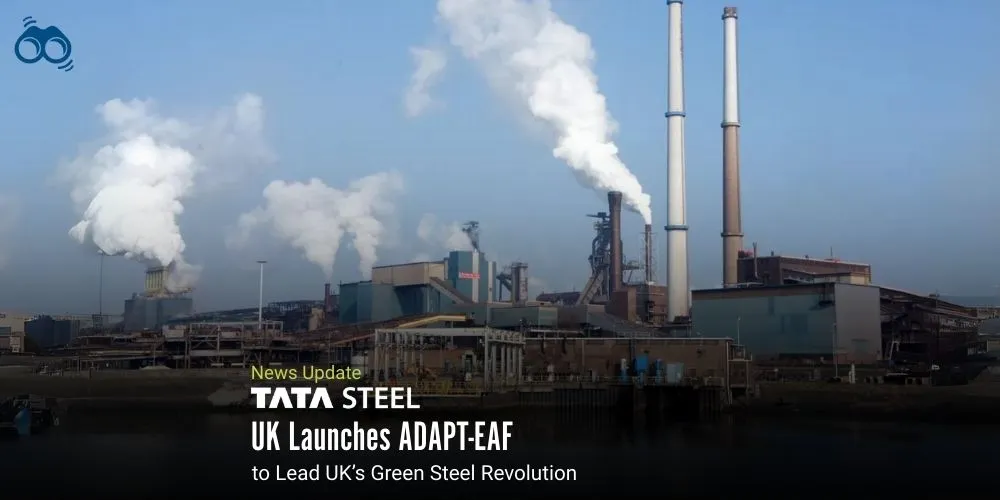Tata Steel UK Partners with Leading Universities to Develop Low-Carbon Steel Solutions
New Research Initiative Targets Clean Steel Production Using EAF Technology
Tata Steel UK is undertaking a major transformation as part of its long-term commitment to sustainable steelmaking. Central to this effort is the launch of a new research initiative titled ADAPT-EAF (Accelerating the Development of Automotive and Packaging Steel Technology for Electric Arc Furnace Production). This ambitious programme aims to develop a new generation of advanced steel products using Electric Arc Furnace (EAF) technology, with applications spanning automotive components and food packaging.
As the UK steel industry shifts towards increased adoption of EAF technology, the ADAPT-EAF initiative seeks to address critical challenges, particularly the management of residual elements in recycled steel. These elements can significantly affect performance in high-demand sectors such as automotive and packaging. To overcome this, Tata Steel UK plans to develop an AI-powered platform capable of predicting how varying scrap types and compositions influence steel quality and processability. When combined with rapid alloy prototyping and testing, this approach will enable the creation of high-performance steel grades optimised for EAF production.
Moreover, the initiative aligns with Tata Steel UK's broader objective of producing cleaner, high-performance steels domestically, while also strengthening technical expertise and promoting best practices in EAF steelmaking across its operations. Backed by £7 million in funding from Tata Steel UK, three partner universities, and additional support from the EPSRC Prosperity Partnerships programme, the project is designed to drive innovation in low-carbon steel manufacturing. It also contributes to the UK’s clean growth strategy by advancing sustainable production methods and supporting a circular steel economy.
ADAPT-EAF is one of 23 new Prosperity Partnerships announced on 10 July by the UKRI Engineering and Physical Sciences Research Council (EPSRC). These partnerships are supported by £41 million in EPSRC funding, alongside £56 million from industry and academic collaborators. Collectively, they aim to tackle pressing industrial challenges in areas such as drug manufacturing, artificial intelligence, and cybersecurity.
The ADAPT-EAF project represents a significant collaboration between Tata Steel UK and three leading academic institutions: the University of Cambridge, Imperial College London, and the University of Warwick. This partnership supports Tata Steel’s vision of becoming a leader in green steelmaking within the UK. The announcement coincides with preparations for the construction of a new Electric Arc Furnace at Tata Steel’s Port Talbot site in South Wales. Rajesh Nair, CEO of Tata Steel UK, emphasised that the Prosperity Partnership has arrived at a pivotal moment, noting that academic resources must be fully leveraged to rapidly develop technologies that ensure a sustainable future for UK steelmaking. The collaboration will focus on building a world-class digital and experimental platform that integrates AI-driven insights with advanced testing, enabling the production of value-added steel products for low-carbon manufacturing.
Subodh Pandey, Vice President of RD&T, New Materials Business, and Graphene at Tata Steel UK, remarked that the partnership offers a unique opportunity to work with leading UK universities to develop innovative, sustainability-focused products and technologies. Over five years, the ADAPT-EAF programme will also support 13 PhD studentships across the three partner institutions, fostering cutting-edge research in advanced steel manufacturing tailored for EAF processing.
Professor Howard Stone, a lead academic from the University of Cambridge, stated that the partnership would unlock the full potential of EAF steelmaking by combining data science with metallurgical expertise to deliver practical solutions for a more sustainable steel industry. Similarly, Professor Claire Davis from the University of Warwick described the Prosperity Partnership programme as a vital platform for industry-academia collaboration, highlighting ADAPT-EAF as a key opportunity to position the UK as a global leader in green steel innovation. Echoing these views, Dr Jun Jiang of Imperial College London noted that Imperial’s expertise in advanced forming and fracture modelling would accelerate the development of low-emission steel grades, further reinforcing the UK’s leadership in sustainable steel technologies. The ADAPT-EAF initiative marks a significant step towards achieving the UK’s net-zero ambitions through innovation, collaboration, and the advancement of low-carbon steelmaking.
Editor’s Note:
The ADAPT-EAF project is an exciting example of how industry and universities can work together to solve real-world problems. As Tata Steel UK moves toward more sustainable ways of making steel, this partnership will help create cleaner, high-quality materials using electric arc furnace (EAF) technology. These new steel products could be used in everything from cars to food cans. What makes this project special is how it brings together top experts from Tata Steel and leading UK universities to use advanced tools like AI and smart testing methods. Their goal is not just to improve steel, but to do it in a way that supports the environment, creates skilled jobs, and helps the UK lead in green steelmaking.
Skoobuzz believes that this is a major step toward a cleaner future and shows the power of research, teamwork, and innovation in building a better tomorrow.














0 Comments (Please Login To Continue)